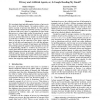Free Online Productivity Tools
i2Speak
i2Symbol
i2OCR
iTex2Img
iWeb2Print
iWeb2Shot
i2Type
iPdf2Split
iPdf2Merge
i2Bopomofo
i2Arabic
i2Style
i2Image
i2PDF
iLatex2Rtf
Sci2ools
130
click to vote
IJCAI
2007
2007
Privacy and Artificial Agents, or, Is Google Reading My Email?
We investigate legal and philosophical notions of privacy in the context of artificial agents. Our analysis utilizes a normative account of privacy that defends its value and the extent to which it should be protected: privacy is treated as an interest with moral value, to supplement the legal claim that privacy is a legal right worthy of protection by society and the law. We argue that the fact that the only entity to access my personal data (such as email) is an artificial agent is irrelevant to whether a breach of privacy has occurred. What is relevant are the capacities of the agent: what the agent is both able and empowered to do with that information. We show how concepts of legal agency and attribution of knowledge gained by agents to their principals are crucial to understanding whether a violation of privacy has occurred when artificial agents access users’ personal data. As natural language processing and semantic extraction used in artificial agents become increasingly so...
| Added | 29 Oct 2010 |
| Updated | 29 Oct 2010 |
| Type | Conference |
| Year | 2007 |
| Where | IJCAI |
| Authors | Samir Chopra, Laurence White |
Comments (0)

